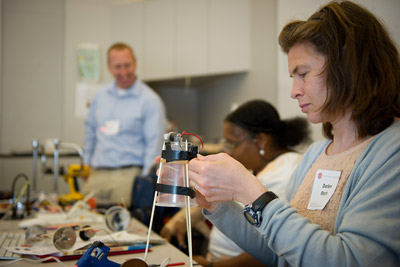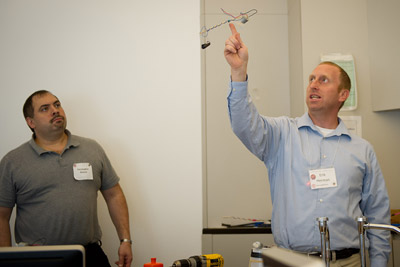NYC teachers learn hands-on activities to inspire students
By Alyssa Sunkin

New York City middle school science teacher Jane Lam is often asked by her students why it is important to learn about science.
So when a series of earthquakes rattled Oaxaca, Mexico, March 20, Lam boiled a pot of water to illustrate how the Earth moves. "A student came up to me after that and said, 'This is why I am here,'" said Lam, who teaches at I.S. 228 middle school in Brooklyn.

Lam says she is always on the hunt for hands-on activities that reinforce complex scientific concepts for her students. That is why she never misses the Cornell Science Sampler Series, a free all-day workshop that provides middle and high school teachers from New York -- particularly from underserved corners of the city -- with classroom lessons and innovative activity ideas to help them engage students in the areas of science, technology, engineering and math.
Lam was one of 50 teachers to attend the March 24 session at Weill Cornell Medical College, which featured seven workshops and a keynote address from Larry Bonassar, Cornell associate professor of biomedical and mechanical and aerospace engineering, on cartilage tissue engineering.
"The activities I bring back to school might not interest an entire class that instant, but if one or two kids say, 'Oh my gosh, this is really cool,' and think about pursuing a career in the sciences, I have done my job," Lam said.
The series, sponsored by the Cornell Center for Materials Research (CCMR), has been offered to New York teachers twice a year since 2007 and complements state education standards. It is a collaboration with the Cornell Institute for Biology Teachers, Cornell Laboratory for Accelerator-based Sciences and Education, Boyce Thompson Institute for Plant Research, Center for Nanoscale Systems and Weill Cornell.
"This is an opportunity to work with teachers to give them background and information about the latest technological advances and how they can incorporate that in the classroom," said Nevjinder Singhota, educational programs director at CCMR.
The workshops, led by professors and graduate students from Cornell in Ithaca and Weill Cornell, showed teachers how to convert recycled materials into functional gadgets, discover genes that are vital to food supply, explore the concept of resonance, study the uses and safety of nanoparticles and learn about friction.
"Teachers can use the [CCMR] tools to figure out ways to make science fun and to find a way to convey that what they are learning is worthwhile and not coming straight out of a textbook," said Kirk Samaroo, a Cornell Ph.D. student in the field of mechanical engineering who was one of the presenters for the friction workshop.
Teachers explored the concept of force and friction by figuring out how much force it would take to move wooden blocks using boards with different surfaces -- rubber, cardboard and sandpaper among them. They then emulated engineers by designing their own miniature car that would win a "slow" race down a ramp.
"I think hands-on activities are a great way to get students interested, and once you get interested you tend to stick with it," said Jennifer Drewes, a Ph.D. student in materials science and engineering.
Bonassar discussed his research on regenerating cartilage to treat arthritis and degenerative disc disease -- information that may not show up on a state exam but might inspire burgeoning scientific minds, he said.
"What I hope teachers take back to their students is that there are really exciting careers where people who are interested in science can make discoveries and change the way people live and affect their lives in positive ways," he said.
Alyssa Sunkin is a writer/editor at NewYork-Presbyterian/Weill Cornell Medical College.
Media Contact
Get Cornell news delivered right to your inbox.
Subscribe